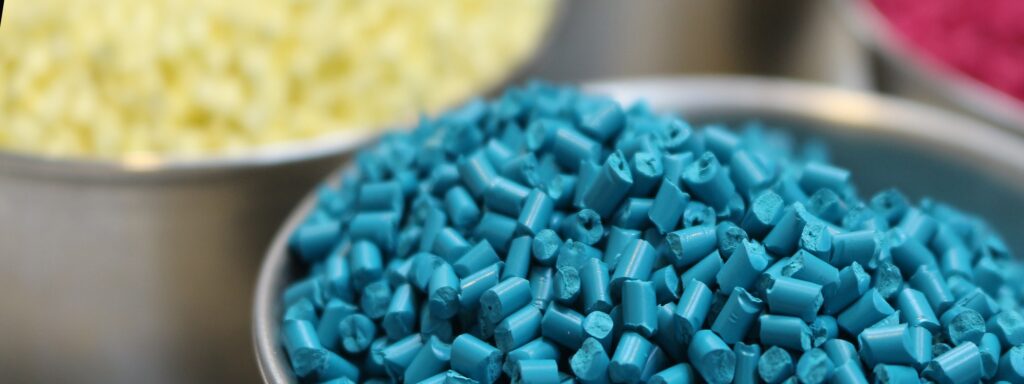As the individual becomes familiar with the term “Masterbatch”; which refers to a concentrated mixture of dyes (coloring materials) and/or additives dispersed or encapsulated and added during the manufacturing process into a carrier resin and then cooled and cut into a granular shape, it is easier to understand special types of masterbatches; such as antimicrobial masterbatches, anti- block masterbatches, processing aid masterbatches,… etc.
In this article we will go in depth in explaining processing aid masterbatches. Polymer processing aids are added to the plastic resin during the manufacturing process to improve the melting, processing and handling of high molecular weight polymers. Polymer processing aids masterbatches are fluoropolymer based concentrate designed to enhance the extrusion of various thermoplastic resins. They can also give aesthetic properties by removing flow marks and die lines so that the finished product is glossy and clear.
Mechanism of Action
Processing Aid Masterbatches are very effective, even when used at very low addition rates.
Plastic Processing Aid Masterbatches mechanism of action is based on fluoro-polymer technology. The fluoro-polymer is dispersed in the main plastic carrier resin, where the two materials are immiscible. During the melting phase, the fluoro-polymer will separate from its carrier resin. The fluoropolymer has a high affinity for metal and will form a dynamic low friction surface coating on the extruder screw, barrel, and die which enables the main polymer to melt and flow with less resistance from the aforementioned tools and utensils used in the manufacturing process. This helps to reduce pressure and motor force within the extruder giving the processor scope for energy savings.
Processing Aids are also used to reduce melt fracture and die lines, and they promote reduced gel formation and cleaner running. This enables the processor to run longer between stops for dies cleaning; thus producing clear and glossy end product.
When using colors and dyes, Processing Aids helps to accelerate and facilitate color change over time.
A number of factors affect the coating equilibrium including; concentration, dispersion, throughput, viscosity, shear gradient, and temperature.
To achieve the coating in a reasonable time the process aid masterbatch is typically added at % l until the beneficial effects are seen. After this, the addition rate can be reduced to %0.5 down to even %0.25 as long as the effect continues to be evident.
A small addition must be maintained as the coating is dynamic, with the polymer melt both abrading the coating and depositing further process aid.
Wells Plastics processing aid masterbatches are very effective, even when used at very low addition rates.
Characteristics and Advantages of Processing Aids
- Act as a lubricant to allow molten polymer to more easily slide and flow by without alternately sticking and slipping.
- Arefluoro-polymers (polymeric compounds containing fluorine) that are sometimes combined or other materials such as polyethylene glycol or tetrafluoroethylene.
- Added frozen into the film or wall. They start acting during the melting method.
- Increase gloss, clarity and transperancy.
- Reduce die buildup.
- Reduce power requirements.
- Effective at very low levels(ppm) but require some time to take effect.
General Guidelines when Using Processing Aids:
- A conditioning period is necessary in order to coat the appropriate extrusion parts.
- Certain processing aids require little preconditioning and are most effective through addition at maintenance levels only.
- 1% processing aids is a typical level necessary for the reduction of die buildup.
Uses of Polymer Processing Aids:
Processing Aid Masterbatches by improving process efficiency, product quality, and machine Processing aids find use in a wide variety of applications from blown film to fiber, profile extrusion, pipe/tubing and cabling processes.
Pure Polymers Processing Aids:
Pure Polymer has supplied specific formulations of polyolefins such as metallocene, styrenics, and polyamides. Application examples include:
- Profile extrusion.
- Injection moulding.





